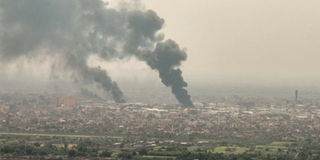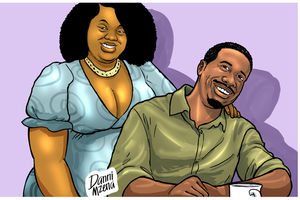Heavy battles in Sudan despite latest truce

An aerial view of black smoke rising over Khartoum Fighting raged in Sudan despite rival forces agreeing to extend a truce aimed to stem nearly two weeks of warfare that has killed hundreds and caused widespread destruction. PHOTO | AFP
What you need to know:
- In the war-ravaged western Darfur region, scores have been killed in days of bitter urban battles in the city of El Geneina, the United Nations says
Khartoum. Fighting raged in Sudan on Friday, despite rival forces agreeing to extend a truce aimed to stem nearly two weeks of warfare that has killed hundreds and caused widespread destruction.
In the war-ravaged western Darfur region, scores have been killed in days of bitter urban battles in the city of El Geneina, the United Nations says.
Black clouds rose over the capital Khartoum as foreign governments scrambled to organise mass evacuations of their citizens, with Turkey's defence ministry reporting Friday that one of their military transport aircraft had come under fire.
There have been multiple truce efforts since fighting broke out on April 15 between Sudan's army led by General Abdel Fattah al-Burhan and the paramilitary Rapid Support Forces (RSF) commanded by his former deputy and fellow coup leader Mohamed Hamdan Daglo. All have failed.
On Thursday, the two sides agreed to extend a repeatedly broken ceasefire for three more days, with the United States, Saudi Arabia, the African Union, the UN and others hoping it would help forge a "more durable cessation of hostilities".
Since a power struggle between Burhan and Daglo erupted into violence, fighter jets have pounded RSF positions in densely packed districts of Khartoum, as fighters on the ground exchanged volleys of artillery and heavy machine gun fire.
In some parts of the city of some five million people trenches have been dug, as gunmen battle each other street by street.
At least 512 people have been killed and 4,193 wounded in the fighting, according to health ministry figures, although the real death toll is likely much higher.
'Foolish war'
Fighting has also spread across Sudan, especially in long-troubled Darfur, where witnesses reported intense conflict and looting.
The Darfur Bar Association, a civil society group, said fighters were "launching rockets at houses" in the West Darfur state capital, El Geneina, some 1,100 kilometres (685 miles) west of Khartoum, It also reported firing from "rifles, machine guns and anti-aircraft weapons".
"There is no food except what people have stored at home," one resident said, asking not to be named.
Analysts have warned that conflict between the army and RSF could spark multiple other militias to exploit the chaos and settle old scores.
UN human rights office spokeswoman Ravina Shamdasani said 96 people were reported to have been killed in El Geneina since Monday.
The UN was "concerned at the serious risk of violence escalating in West Darfur", Shamdasani said, warning that the hostilities between the military and RSF "have triggered intercommunal violence".
Fighting has spread "nearly all over the city" and fighters have looted and torched "markets, public buildings, aid warehouses and banks", the Bar Association added.
It urged Burhan and Daglo to "immediately stop this foolish war that is being waged on the backs of civilians".
Darfur is still reeling from the devastating war that raged in the 2000s when then hardline president Omar al-Bashir crushed ethnic-minority rebels by creating the Janjaweed militia to carry out atrocities, a force that later formed the basis of Daglo's RSF.
The scorched-earth campaign left at least 300,000 people dead and close to 2.5 million displaced, according to UN figures, and saw Bashir charged with war crimes, crimes against humanity and genocide by the International Criminal Court.
In El Fasher, state capital of North Darfur, medics are struggling to cope with an influx of wounded, said Mohamed Gibreel from Doctors Without Borders (MSF).
"The situation is very, very difficult," Gibreel said.
Mass exodus
Amid the chaos, several prisoners escaped jail, including war crimes suspects from Bashir's regime.
The UN on Friday voiced alarms at the prison breaks, pointing to "the prospect of further violence, amid a generalised climate of impunity".
The World Food Programme has said the violence could plunge millions more into hunger in a country where 15 million people -- one-third of the population -- need aid to stave off famine.
Residents of Khartoum have meanwhile been shuttered at home, running dangerously low on food, cash and fuel needed to get out.
Over 75,000 have fled their homes due to the fighting, according to the UN's International Organization for Migration (IOM), while tens of thousands have crossed into neighbouring countries, including Chad, Egypt and South Sudan.
South Sudan's foreign ministry warned Friday that the conflict's "spillover effects are already visible".
Burhan and Daglo -- commonly known as Hemeti -- seized power in a 2021 coup that derailed Sudan's transition to democracy, established after Bashir was ousted following mass protests in 2019.
But the two generals later fell out, most recently over the planned integration of the RSF into the regular army.
Diplomatic pressure has ramped up, with Egypt expecting a delegation from Burhan on Saturday.




